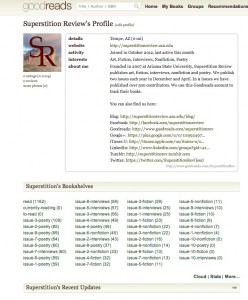“I cannot say what cannot be said, but sounds can make us listen to the silence.”
R.D. Laing, The Politics of Experience
 Having just graduated from a research university, this seems like a convenient forum to reflect on the intersection of what became my main fields of study: literary theory and creative writing. What has struck me most profoundly after my four years (and what this article is in reaction to) is that philosophers are better creative writers than the creative writers are. I would levy a guess that few people could find more beautiful lines written, think what you will of their theories, than those of the first chapters of Deleuze and Guattari’s Anti-Oedipus. And is there a writer—literary, creative or otherwise– who has ever conveyed the sublime joy of linguistic play better than the dense complexity of Jaques Derrida? While this list could be endless, after four years of studying literature, I came to be left with this question: How is it that those who wrote about literature became superior to those actually writing it?
Having just graduated from a research university, this seems like a convenient forum to reflect on the intersection of what became my main fields of study: literary theory and creative writing. What has struck me most profoundly after my four years (and what this article is in reaction to) is that philosophers are better creative writers than the creative writers are. I would levy a guess that few people could find more beautiful lines written, think what you will of their theories, than those of the first chapters of Deleuze and Guattari’s Anti-Oedipus. And is there a writer—literary, creative or otherwise– who has ever conveyed the sublime joy of linguistic play better than the dense complexity of Jaques Derrida? While this list could be endless, after four years of studying literature, I came to be left with this question: How is it that those who wrote about literature became superior to those actually writing it?
For those of us unfamiliar and those of us repelled (perhaps rightly so) from theory and philosophy by its urgency or self-importance, ‘literary theory’ predicates a multi-disciplinary basis of insights (philosophical, sociological, linguistic) centered loosely around language. In university literature programs, it functions in so far as pursuits in knowledge parallel to literature can draw a critical focus on how a reader experiences language (for the act of reading is at essence an experience of language). At its best, theory in the context of literary criticism belies the question: what of my experience (of reading) belongs to me (of course, what am I?) and what belongs to the words themselves?
Hardly approached, the question remains. What is the use of literary theory for a creative writer?
Few neither before nor since have made the point more radically than Julie Kristeva, a French semiologist: literature does not exist. There is only language. In The Ethics of Lingustics she approaches the linguistic community with an object of ‘poetic language’ (i.e. language which does not assume first and foremost communication as its goal) and follows by positing that from this view, all language is always already-poetic .
Suddenly, walls fall. Ernest Hemingway runs screaming through Tucker Max’s kitchen. Sigmund Freud is washing his hands after taking a shit in Ariana Huffington’s bathroom. A how-to manual is telling a joke to a poorly written blog post while standing in line behind a coffee table book about pop art. ‘Poetic language’ is the ambiguous line at which language approaches but never meets meaning absolutely nothing. ‘Poetic language’ is a kaleidoscope through which all writing, especially that which makes such pretensive strides at considering itself ‘creative’ writing, becomes exactly what it is: nothing-but-language.
We creative writers should be (and sometimes are: http://poeticjabberwocky.blogspot.com/2010/06/my-favorite-legal-terms-that-sound.html) looking on in a jealous rage at the rate at which scientists and lawyers create language in their everyday pursuits (‘dichlorodiphenyltrichloroethane’ pulled from a schizophrenic need to find this chemical distinct from that chemical, ‘habeas corpus’ kept from the linguistic grave that is ‘dead’ language).
Creative writers! Do not fall prey to genre-writing, forcing language between some minimum and maximum point at which it is allowed to mean anything. Creative writers! We are the linguistic scientists of our time. Let us allow our vast, oft-loved and romanticized empty pages become the playful laboratories of language itself. And as we, childish scientists, send language through our experiments, meant to prove nothing at all, only valid if results cannot be repeated, creative writing becomes all that it already is and ever hopes to be: language. Not stories or narrative or characters (not that these things need to be avoided) but tone and rhythm and rhyme and meter and lineation and alliteration: just language. Beautiful, playful, surprising language. Nothing- but-language.
